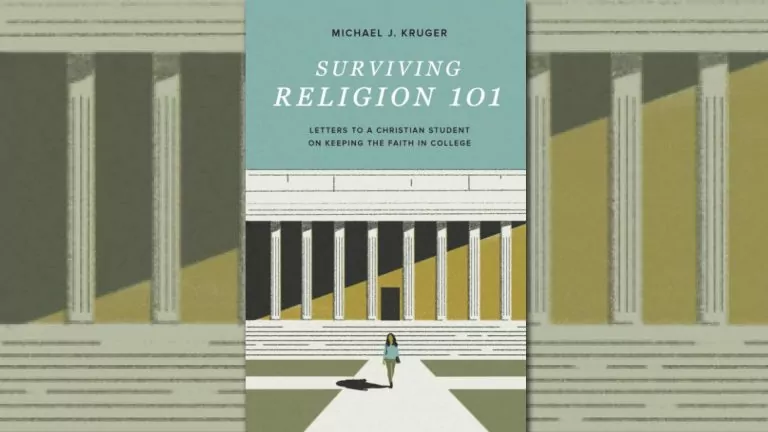by Michael J. Kruger
2021 / 262 pages.
Rating: GOOD/Great/Give
From time to time I search online for “ex-Can RC.” I’m curious as to why people would leave the Canadian Reformed Churches. What makes people walk away from the church and sometimes the faith in which they were raised? What can I learn from that as a pastor?
Several individuals mention how they were told not to study philosophical or scientific questions, not to think too deeply about things, nor to read widely for themselves outside of the “approved CanRC authors.” Church leaders allegedly told them to check their brains at the door. Well, we all know what some people do when they’re told not to do something. They started reading and studying for themselves and soon discovered that they’d been brainwashed and hoodwinked by their church leaders. The exit came into view.
If we presume these stories are even a little accurate, what might lead pastors or elders to give those kinds of warnings to their flock? Perhaps it’s fear. Maybe they’re afraid that the arguments of unbelievers will persuade their members. Connected with that, possibly it is the worry that we don’t readily have solid counter-arguments so “You just have to believe.”
Truth has nothing to be afraid of
That kind of approach is counter-productive. We should actually encourage our members to think more deeply, to read more widely, to engage with the big questions posed by unbelieving philosophy and science. Why? Because we ought to have confidence that the truth of God is more powerful than every lie.
However, at the same time, we need to equip our people with tools to be able to see how, where, and why this is so.
That’s where Michael Kruger’s Surviving Religion 101 will be an invaluable resource. The author is not only a New Testament professor at Reformed Theological Seminary, but also a father to three children. While he’s written this for them, the book is particularly addressed to his oldest daughter Emma as she began studies at the University of North Carolina. It takes the form of 15 letters to her.
Reformed answers to big questions
Through these letters, Kruger addresses questions that Christian university students are likely to face in and out of the classroom. Some of those questions:
- My professors are really smart – isn’t it more likely that they’re right and I’m wrong? (chapter 2)
- I have gay friends who are kind, wonderful, and happy – are we sure that homosexuality is really wrong? (chapter 5)
- There is so much suffering in the world – how could a good God allow such evil? (chapter 7)
- My professor keeps pointing out contradictions in the gospels – can I still trust them? (chapter 11)
- Some parts of the Bible seem morally troubling – how can a book be from God if it advocates oppression or genocide? (chapter 14)
- Sometimes it feels like my faith is slipping away – how do I handle doubts about what I believe? (chapter 15)
In answering all these questions, Kruger takes a Reformed approach. He presents the truth of what God’s Word says and then he also explains how the alternative position is untenable.
A peak at what’s inside
In chapter 3, Kruger deals with the question of whether it’s legitimate to claim that Christianity is the only right religion. One of the connected counter-claims is that all religions are actually the same. Here’s part of how Kruger answers that:
“…there are features about Christianity that make it genuinely distinct from the rest of the world’s religions. And the fundamental difference is this: Christianity is not just another religion about being a good person. Needless to say, this flies in the face of what most people think about religion. Just consider the very popular television show The Good Place, starring Kristen Bell. As strange as it sounds, the show is a comedy about heaven (the good place) and hell (the bad place). On the show, the good place is where good people go, regardless of their religious beliefs. Whether you’re Hindu, Buddhist, or Muslim, you go to the good place as long as your good deeds outweigh your bad.
“In contrast, Christianity says something stunning. Something counterintuitive. Something unique. It says that bad people go to the good place. Just let that sink in for a moment. Heaven is not for good people but for sinful people forgiven by grace…”
As you’ll note, Kruger isn’t writing here for scholars. He’s done his homework and he’s got the endnotes to prove it, but the book is written at a popular level.
Conclusion
So, even though it’s written for Christian college/university students, Surviving Religion 101 ought to be read far beyond that audience. Many Christian young people, university-bound or not, will find it accessible. In fact, starting this year, I’m going to make this the book our young people traditionally get when they make public profession of faith. And if it’s going to be manageable for them, it should also be for many adults too.
Scripture says in 2 Corinthians 10:4, “For the weapons of our warfare are not of the flesh but have divine power to destroy strongholds.” We can have that confidence in our Christian faith because the truth of it is established on God and therefore it’s objectively true. We have nothing to fear from the arguments of unbelievers.
Books like Kruger’s Surviving Religion 101 help us see how Christianity isn’t only spiritually comforting, but also well-grounded and eminently reasonable. So, read widely. Read non-Christian authors. Read philosophy and science. But know that the tough questions they raise have been adequately answered by Christian scholars like Michael Kruger.
The author offers a video series on the same topics as the book, which you can access by signing up with your name and email address as this link. You can see the first introductory episode of the series below.











